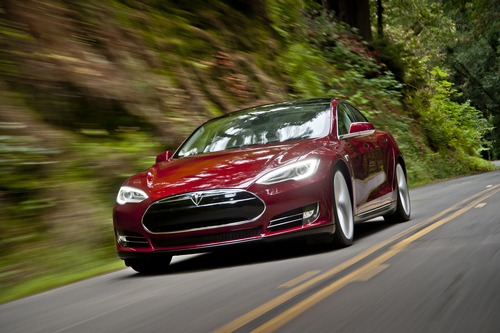If Nissan develops a 180+ mile range Nissan Leaf & Infiniti EV, and GM develops a 200+ mile range electric car, and BMW continues pushing into the EV market, and VW follows through on plans to be a major force in the electric vehicle market, all of which is due to happen in 2017, then where will Tesla Motors be? Earlier today I wrote about how Tesla Motors is on a track to be selling as many cars as Porche by 2015/2016. But, what if these other large automotive companies also develop 200+ mile range electric cars? What happens to Tesla?
The attraction to Tesla Motors is two-fold – the Model S is a phenomenally excellent car – that has a 265 mile electric range, and can recharge in under an hour, for free, at a Supercharger station.
The Gen 3 car from Tesla Motors is to be priced at $35,000 base MSRP, before tax credits, have a 200+ mile electric range, and go on sale in 2017.
In 2017-2018 it appears other automakers will develop 200+ mile range electric cars, some at affordable prices. That would erase one of the advantages Tesla has over other automakers. Will the excellence Tesla builds into their cars be enough to sustain them when they have competition?
So far Tesla has simply not had competition – nobody is making a car similar to the Tesla Model S. Yes there are plenty of luxury cars in that price range, but none of them are electric, and none of them have scored 99 points from Consumer Reports. Well, except for that one car from Lexus. The Model S driving experience is out of this world, and I’m not at all surprised that Model S sales are doing so well.
If the future pans out as promised, in 2017-2018 several companies will be competing for the same exact market niche – all electric car with 200+ mile driving range and mid-$30k price range. Tesla won’t be in it’s own market niche, it’ll be in a crowded niche with several companies, each with decades of experience behind them.
Will Tesla Motors be able to compete?
The prediction that Tesla will be selling 150,000 or more cars by 2015-16 assumed there’s no competition to peel off potential customers. But if those customers suddenly have multiple models to choose from, will they go with the young upstart or with the tried and true automaker?
That’s the question which has stymied all automobile manufacturer startup companies for the last 60+ years. Do car buyers trust the upstart, or the tried and true?
- Highway design could decrease death and injury risk, if “we” chose smarter designs - March 28, 2015
- GM really did trademark “range anxiety”, only later to abandon that mark - March 25, 2015
- US Government releases new regulations on hydraulic fracturing, that some call “toothless” - March 20, 2015
- Tesla Motors magic pill to solve range anxiety doesn’t quite instill range confidence - March 19, 2015
- Update on Galena IL oil train – 21 cars involved, which were the supposedly safer CP1232 design - March 7, 2015
- Another oil bomb train – why are they shipping crude oil by train? – Symptoms of fossil fuel addiction - March 6, 2015
- Chevron relinquishes fracking in Romania, as part of broader pull-out from Eastern European fracking operations - February 22, 2015
- Answer anti- electric car articles with truth and pride – truth outshines all distortions - February 19, 2015
- Apple taking big risk on developing a car? Please, Apple, don’t go there! - February 16, 2015
- Toyota, Nissan, Honda working on Japanese fuel cell infrastructure for Japanese government - February 12, 2015











